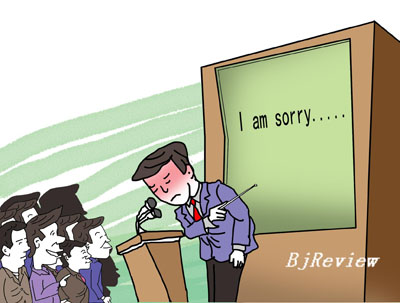
Saving face is something that is deeply rooted in Chinese culture, and for over 5,000 years this concept has motivated and determined the outcome of decisions and behavior across the spectrum of Chinese society. It was, therefore, particularly surprising when Tang Jie, Secretary General of the Municipal Government of Shenzhen, in Guangdong Province, made a vow to local lawmakers that, if his government did not perform well in terms of administration, the officials involved should apologize publicly for their misconduct. His pledge was made after an actual letter of apology explaining the reason for traffic jams in a bustling business district in the city, and other apologies demanded by the municipal supervision bureau for negligence and malpractice of civil servants were made to a wide-eyed Shenzhen public.
They were actions well received by a public very conscious of the humiliating impacts loss of face had on the apologizing officials concerned.
It seems apologies were pretty much in vogue at this year's annual full session of the National People's Congress, China's top legislature, after Vice Premier Wu Yi and Minister Zhou Shengxian of the State Environmental Protection Administration apologized for problems concerning food and medicine safety and environmental pollution. An anchorman with China's national TV broadcaster hailed this as a more responsible attitude toward government's accountability, adding that it will also put the officials and their governing departments under pressure and urge them to do a better job.
However, not everyone was over the moon after the mea culpa confessions. Some worried those apologies of this nature might be used as meaningless political "window dressing" if it became popular. Detractors say that even if officials really feel regret and are sincere in their apologies, they may only be morally sorry for what happened, which is not enough. State administration is also responsible for political accountability, democratic obligation and legal liability, they say.
I'm sorry-blah, blah, blah
Zhang Jingwei (China Economic Times): Chinese civil servants wear two hats. On one hand, they have to abide by laws for public officials, while on the other, they have to be supervised under the Communist Party disciplinary code and other established institutions. All these rules and disciplines included in the civil service system are set to guarantee a more complete and multi-dimensional administrative system. The public image of officials has been tarnished due to endless corruption scandals, irregularities in law enforcement and pointless administrative orders, as well as the abuse of their authority. Many officials have little understanding of administration of law, making the institutions they represent ineffective.
Public apologies from governmental officials might cease complaints and assuage public anger, but could never redeem officials as far as legal accountability is concerned. No wonder some legal experts suspected the motives of such apologies to be excuses for wrongdoings by officials.
Shenzhen's local leadership, which requires moral "compensation" to the ones who suffered from official misconduct, has overemphasized the code of ethics. That may weaken the legal face of the authorities, making it harder to achieve the full realization of rule of law.
Xi Xuchu (www.people.com.cn): At a press conference held after this year's full session of the National People's Congress, Premier Wen Jiabao reiterated that no official can abuse his or her authority, pledging that his government, as guardian of people's interests, will serve the people better. He warned that low efficiency, infringements on citizens' rights or using public power to seek individual benefits will be punished. In this case, an apology after being wrong is no more than reasonable.
To tell the truth, any apology is the consequence of a mistake. The public should be aware of the fact that they should not pay administrative costs for such apologies, which usually indicate violations of their interests.
| 